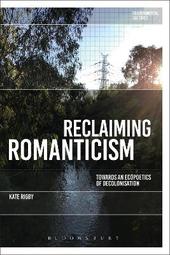
|
Reclaiming Romanticism: Towards an Ecopoetics of Decolonization
Paperback / softback
Main Details
Description
The earliest environmental criticism took its inspiration from the Romantic poets and their immersion in the natural world. Today the "romanticising" of nature has come to be viewed with suspicion. This open access book, written by one of the leading ecocritics writing today, rediscovers the importance of the European Romantic tradition to the ways that writers and critics engage with the environment in the Anthropocene era. Exploring the work of such poets as Wordsworth, Shelley and Clare, the book discovers a rich vein of Romantic ecomaterialism and brings these canonical poets into dialogue with contemporary American and Australian poets and artists. Kate Rigby demonstrates the ways in which Romantic ecopoetics responds to postcolonial challenges and environmental peril to offer a collaborative artistic practice for an era of human-non-human cohabitation and kinship. The ebook editions of this book are available open access under a CC BY-NC-ND 4.0 licence on bloomsburycollection.com. Open access was funded by Knowledge Unlatched.
Author Biography
Kate Rigby is Professor of Environmental Humanities at Bath Spa University and Adjunct Professor at Monash University, Australia. One of the world's foremost ecocritics, she was the founding President of the Association for the Study of Literature and the Environment (Australia-New Zealand). Her previous books include Topographies of the Sacred: The Poetics of Place in European Romanticism (2004) and Dancing with Disaster: Environmental Histories, Narratives, and Ethics for Perilous Times (2015).
ReviewsReclaiming Romanticism takes some risks in its approach, but invites trust from the reader thanks in part to Rigby's clear, likeable style, which incorporates accounts of the author's personal experiences. Ultimately Reclaiming Romanticism is able to bear the weight of its ambition because Rigby is in control of her wide range of material and knows when to temper her claims for what literature, and literary criticism, can achieve. * European Romantic Review * Rigby's ability to combine multiple, distinct fields of knowledge - from climate science to theology to new materialism - into seamless, productive amalgamations ... is unparalleled in ecocriticism, and it makes Reclaiming Romanticism both a pleasure to read and genuinely impressive. * Australian Literary Studies * Rigby presents a powerfully persuasive argument that Romanticism, having emerged at a 'time of rupture' comparable with the upheavals of the present moment, might yet have much to offer. The book combines a bold methodology with the ability to cross literary eras and draw on a wide range of literature and philosophy, while always keeping the discussion pertinent to the ecological crisis of our times. As such, Rigby has provided us with a beacon for ecocritical scholarship. * Worldviews * In this elegantly written study from within the ecological humanities, Kate Rigby addresses the complex inheritances of Romanticism in what she calls the 'perilous present'... With its depth of historical knowledge of Romantic discourse... and its breadth of understanding of the afterlives of Romanticism in decolonising and Indigenous contexts, particularly North American and Australian, these readings are exemplary of literary scholarship in touch with urgent contemporary realities. Rigby's decolonising ecopoetics shows us, with an impressive grasp of intellectual history and theoretical power, how artistic movements like Romanticism are able to inform our grappling with the crises of the present. * Philip Mead, Professor Emeritus, The University of Western Australia, Australia * Bursting with ideas, close readings, and warnings, Reclaiming Romanticism revitalises questions about nature and the Anthropocene, kinship and care, theology and creation, decolonisation and communities, and meets its own worry and sadness with possibilities of hope and liberation. -- Emma Mason, University of Warwick, UK * Green Letters *
|